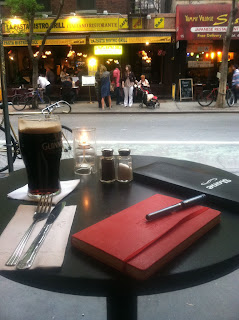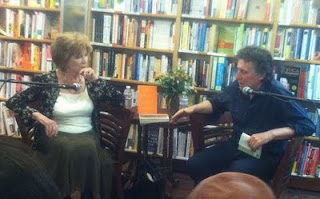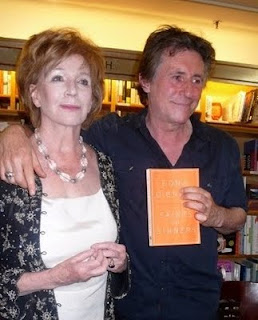I moved from Dublin to London a little over ten years ago. My head was full of poetry, music, art and anxiety. I loved writing and I loved writers. While I have a hard time remembering my last few months in Ireland, one event, driven by this passion, sticks out: seeing Nick Cave twice in one day.
The lanky, deep-voiced Australian artist was in Dublin on the lecture circuit, delivering his treatise on the relationship between creativity, poetry, life, and love. He held an afternoon chat, during which he would occasionally break away to play the odd tune on a grand piano. I recall his stripped-down version of “West County Girl,” with its dramatic, low-roaring ending of “then purrrrrs… AGAIN” sent chills down my spine. He talked about saudade. He talked about owning grief. He talked about Jesus, creation, the Old Testament, the New, an the relationship of art -of writing -to each. Fancying myself a true writer, I was in love with Cave’s dramatic, deeply-felt works, even if I didn’t quite have the life experience to fully understand them. And a writer talking about writing… was manna from heaven. Verging on broke, I took what little I had and bought another ticket for the same talk happening that evening. I filled an entire journal with notes hastily scribbled during his chat, and once I’d run out of ink, I sat, silent and pie-eyed, hoping to someday be half the writer Cave was -and indeed, still is.
Cave has never shied away from showing his writerly streak, in all its flagrant glory. Part of this, for those who know his work, comes from his early exposure to literature courtesy of his English teacher-father, who died when Cave was still quite young. Known for his work with the Bad Seeds, Cave also published And the Ass Saw The Angel (Harper Collins) in 1989, a wildly surreal, violent, bizarre work that was equally potent, poetic, and memorable. He’s always worn his love for the written word proudly on his sleeve. He says (in the clip above) that his work has always been “bursting at the seams with lyrical information” -which is putting it mildly in terms of his own gift with words. As befits a rock and roll guy with a poetic streak, he credits music for giving life to his words, noting there’s “a musical rhythm to the language.” But his heart’s still firmly with those words, just as much as it is with tones, sounds, and rhythms.
The Death Of Bunny Munro (Harper Collins) is Nick Cave’s latest novel. While I’m not the biggest fan of some of his more recent music (Grinderman being the exception), I admit that the novel is deeply intriguing. It’s as if, in embracing his literary side, he’s also embracing the aggressively male side that characterized at least a portion of his work in the 1990s with the Bad Seeds (the stuff I particularly adored then, natch); it’s like Cave is exercising (not exorcising) that still-remnant Bad Seed, the one that’s been at least outwardly tamed by domestic responsibility. He can live in the squalid, dark corners of his imagination through writing, without robbing the his other creative pursuits of their pungency.
I’m really glad to see Cave still writing, and still exploring this important side of his artistry. And I’m glad he’s being honest about it, in traveling through this kind of dark, non-cuddly terrain. Artists worth their salt shouldn’t, by their nature, always release likable, easily-digestible stuff. The artists I happen to love the most, that tend to stay with me longest, often release work that is challenging, thought-provoking, hard -and distinctly non-nice. Record companies may not always like their artists’ extra-curricular creative activities, but… balls, I do, and some of them enjoy doing it, too. Sometimes it’s the only thing that keeps sanity intact for artist and audience alike.
That doesn’t mean sales don’t matter, though. As if to underline this, Bunny Munro was itself released in three formats: hardcover, audio book, and iPhone application. The audio book version includes a score by Dirty Three member/Bad Seed/scary-lookin’ dude Warren Ellis. The audio book intrigues because you get Cave’s deep voice giving a deeply-dramatic rendering of his own words (I remember in Dublin he called them “children,” which I was chuffed at, referring as I did then to my own work in the exact same way); in addition, you get Ellis’ intuitive musical underscoring, creating an eerie, atmospheric complement. If you have an iPhone, you can partly-read, partly-listen, using the specially-designed app. Who would’ve thought books would be so easy, so multi-faceted, so … octopus-like in reach, scope, presentation and marketing? I don’t buy the whole romantic notion of “simple appeal” even though I do enjoy the sensual appeal of the tangible (I mean hell, I love cooking, right?). I love how technology and tradition have married with The Death Of Bunny Munro, and I love that Nick Cave is so very open to it. He says he wrote the first chapter on his iPhone, and the rest in longhand. And yet he equally admits that sitting down with a book is probably more intimate.
This balance between tradition and technology is really refreshing; its equal embrace by an artist of Cave’s calibre is downright inspiring. I haven’t decided which format I’ll get yet, but I’m leaning at the audio book -if only to hear that dramatic voice reading words rendered by mind, heart, and those long, elegant fingers. I ran into Cave -by accident or some grand intelligent design -several time after I moved from Dublin to London. He was in Toronto recently to read from Bunny Munro and do a raft of interviews as well as a book signing. When I heard his voice on the radio, I smiled. My romantic ideas around writing have totally vanished, but Cave’s respect for his art is a boon to me still. And I can’t wait to be corrupted by Bunny.
 My writing has changed, and I blame (thank?) McNally Jackson. Without actor Gabriel Byrne liking the bookstore so much, I would’ve never had the chance to meet and chat with one of my literary heroes -and my writing wouldn’t be experiencing the painful if necessary (and deeply overdue) growing pains it is now.
My writing has changed, and I blame (thank?) McNally Jackson. Without actor Gabriel Byrne liking the bookstore so much, I would’ve never had the chance to meet and chat with one of my literary heroes -and my writing wouldn’t be experiencing the painful if necessary (and deeply overdue) growing pains it is now. It’s hard for me to verbalize the effect O’Brien’s work has had on me the last few years, particularly her latest work, a collection of short, powerfully moving stories. Her use of langauge is deeply poetic and loudly, proudly recalls some of the best in Irish writing, namely James Joyce and Seamus Heaney, but with the distinctly feminine voice and brisk narrative quality of Clare Boylan. O’Brien is in a class by herself, however. Born in County Clare in 1930, she had, like many of the time, a convent education and, in her conversation with Byrne, spoke dramatically of the limitations and restrictions placed on her and fellow students. There’s a refreshing honesty to both her work and to seeing her read and speak in person. O’Brien is a very theatrical person, and, even in conversation, carefully chooses her words, drawing out vowels and making dramatic pauses, as if she’s delivering the best damn monologue you’ve ever experienced.
It’s hard for me to verbalize the effect O’Brien’s work has had on me the last few years, particularly her latest work, a collection of short, powerfully moving stories. Her use of langauge is deeply poetic and loudly, proudly recalls some of the best in Irish writing, namely James Joyce and Seamus Heaney, but with the distinctly feminine voice and brisk narrative quality of Clare Boylan. O’Brien is in a class by herself, however. Born in County Clare in 1930, she had, like many of the time, a convent education and, in her conversation with Byrne, spoke dramatically of the limitations and restrictions placed on her and fellow students. There’s a refreshing honesty to both her work and to seeing her read and speak in person. O’Brien is a very theatrical person, and, even in conversation, carefully chooses her words, drawing out vowels and making dramatic pauses, as if she’s delivering the best damn monologue you’ve ever experienced. Telling the truth isn’t always easy – especially when it’s sitting there in front of us. Some truths are easier to swallow than others – and once we discover them, it’s up to us how we choose to live with their loud mewlings, awkward quietude, and late-night bawling. Do we pretend they’re not there? Or face that truth square-on? On Monday night, Byrne confessed to her that, back when he was growing up in Ireland, “I read your work to find myself.” The author seemed stunned, caught off guard by such an admission, and responded, carefully and wide-eyed, “You mean to find an identity? a larger sort of identity?” Byrne re-phrased things so as not to put her on the spot, but we all knew what he meant, as he looked at his friend with a mix of awe, admiration, and gratitude.
Telling the truth isn’t always easy – especially when it’s sitting there in front of us. Some truths are easier to swallow than others – and once we discover them, it’s up to us how we choose to live with their loud mewlings, awkward quietude, and late-night bawling. Do we pretend they’re not there? Or face that truth square-on? On Monday night, Byrne confessed to her that, back when he was growing up in Ireland, “I read your work to find myself.” The author seemed stunned, caught off guard by such an admission, and responded, carefully and wide-eyed, “You mean to find an identity? a larger sort of identity?” Byrne re-phrased things so as not to put her on the spot, but we all knew what he meant, as he looked at his friend with a mix of awe, admiration, and gratitude.